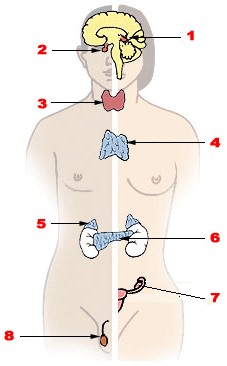Kabuki syndrome
Endocrinological problems in Kabuki syndrome
Endocrinology is a branch of medicine that studies the normal function of glands, the action of hormones, their metabolic consequences, and their alterations.
The endocrine system consists of various glands located throughout the body that secrete hormones into the bloodstream or surrounding tissues to carry out their actions. These hormones can affect a single organ or multiple organs simultaneously.

Important endocrine glands (male on the left, female on the right): 1. Pineal gland; 2. Pituitary gland; 3. Thyroid gland; 4. Thymus; 5. Adrenal gland; 6. Pancreas; 7. Ovary; 8. Testicle (Wikipedia)
The endocrine system regulates growth, cellular metabolism, sexual development and reproduction, sleep-wake cycles, immune function, and mood states.
In patients with SK, we may find alterations in thyroid hormone levels, growth patterns, blood sugar and insulin levels, sex hormone levels, and pubertal development. Generally, the endocrine dysfunctions that most frequently present symptoms are those related to growth, hypoglycemia, obesity, and sexual characteristics.